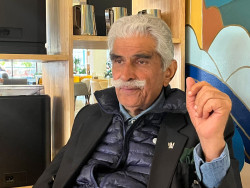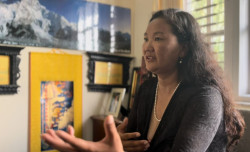Minute Talk
Lhakpa Sherpa, who climbed Everest for a record 10th time this May, says she’s worried about melting glaciers and growing piles of garbage in the Himalayas - problems triggered by growing global carbon emissions and increasing human activities.
Breaking her own previous record of the highest number of Everest summits by a woman, the 48-year-old set a new record on the highest mountain on May 12, 2022.
She scaled the highest mountain for the first time in 2000, becoming the first Nepali woman to safely ascend and descend the highest mountain. Before her, Pasang Lhamu Sherpa climbed Everest, becoming the first Nepali woman to do so, but she died on her way down after being caught in a bad weather.
After setting her first Everest record, Lhakpa moved to USA, where she got married to a US climber. The mother of three children, Lhakpa Sherpa currently lives - and works part time at Whole Foods - in Hartford, Connecticut, where she also teaches outdoor activities such as trekking and mountaineering to youngsters.
Yet she has remained connected to her Himalayan roots, returning to climb Everest almost every year. After 2000, she performed most of her Everest feats from the Chinese side, but this year she did it from the Nepali side, having started the journey from Solu-Salleri, located at least seven days’ trek away from Everest Base Camp.
“This time I tried to follow Sir Edmund Hillary’s footsteps and started my journey to Everest from Salleri,” Lhakpa Sherpa said in an interview with NepalMinute's MINUTE TALK, a video section which features conversations with newsmakers. “When I finally made it back to the top of Everest again, I felt I could do it!”
Once at the base camp and on the mountain slopes, she said, she was appalled at the sight of garbage left behind by trekkers and mountaineers – and at the “melting of glaciers”, which is blamed on global warming caused by heat-trapping gases in the atmosphere.
She said: “Many glaciers are melting. I visited the Khumbu glacier in 2000. At that time there was a lot of ice and snow - but now the glaciers are melting. I would like to clean the mountains. I would like to remove the garbage.”
Scientists say Himalayan peaks are warming up to 0.7C faster than the global average. And a 2019 ICIMOD study report said global warming is threatening glaciers across the Hindu Kush Himalayas, which could lose one third of the ice by the end of the century even if temperature rise is limited to 1.5C.
Yet the highest mountains continue to attract trekkers and climbers from around the world. For instance, the Everest Base Camp hosted over 1,000 people during the last climbing season – April to May. Despite strict rules and efforts to clean up, concerns over garbage, pollution and melting glaciers remain.






